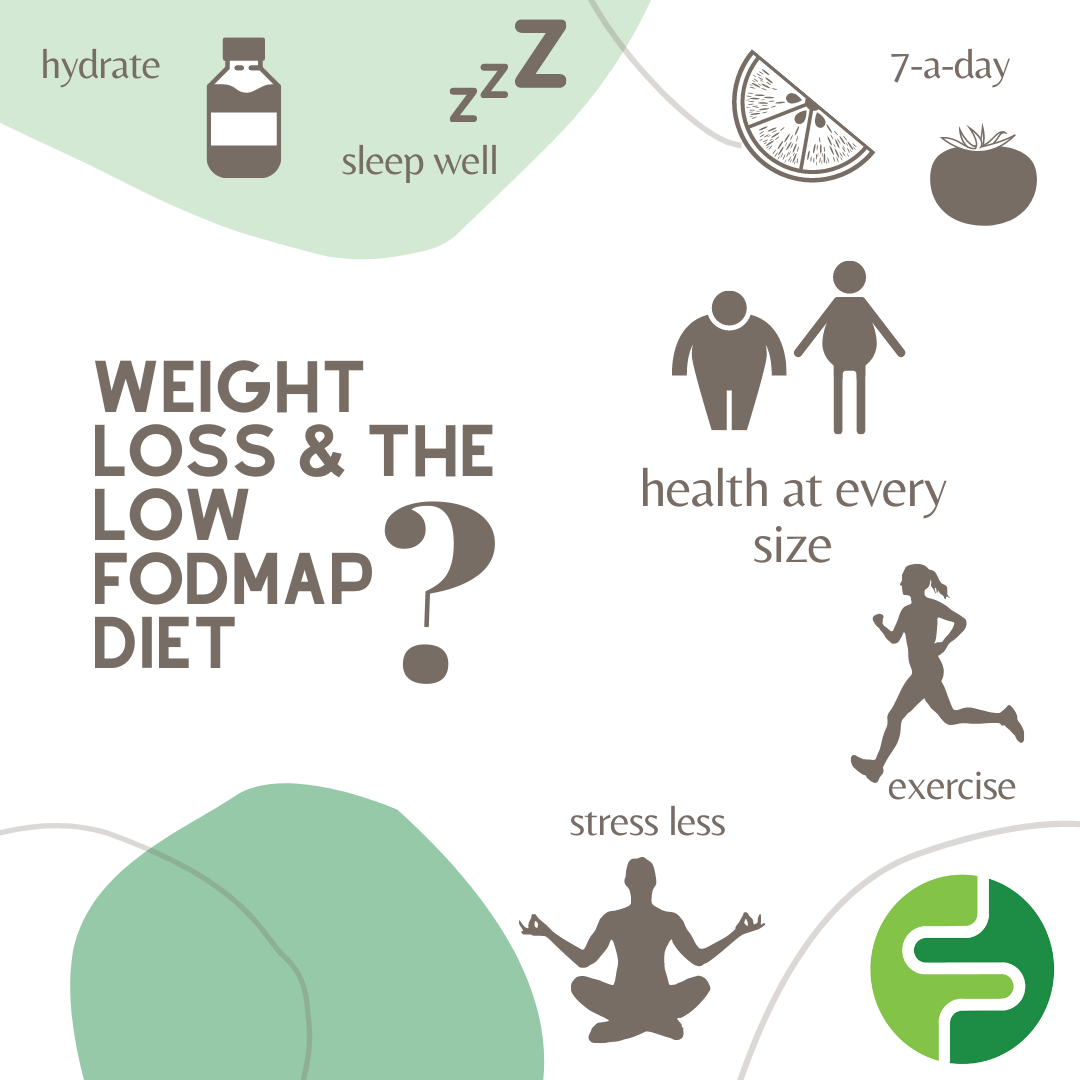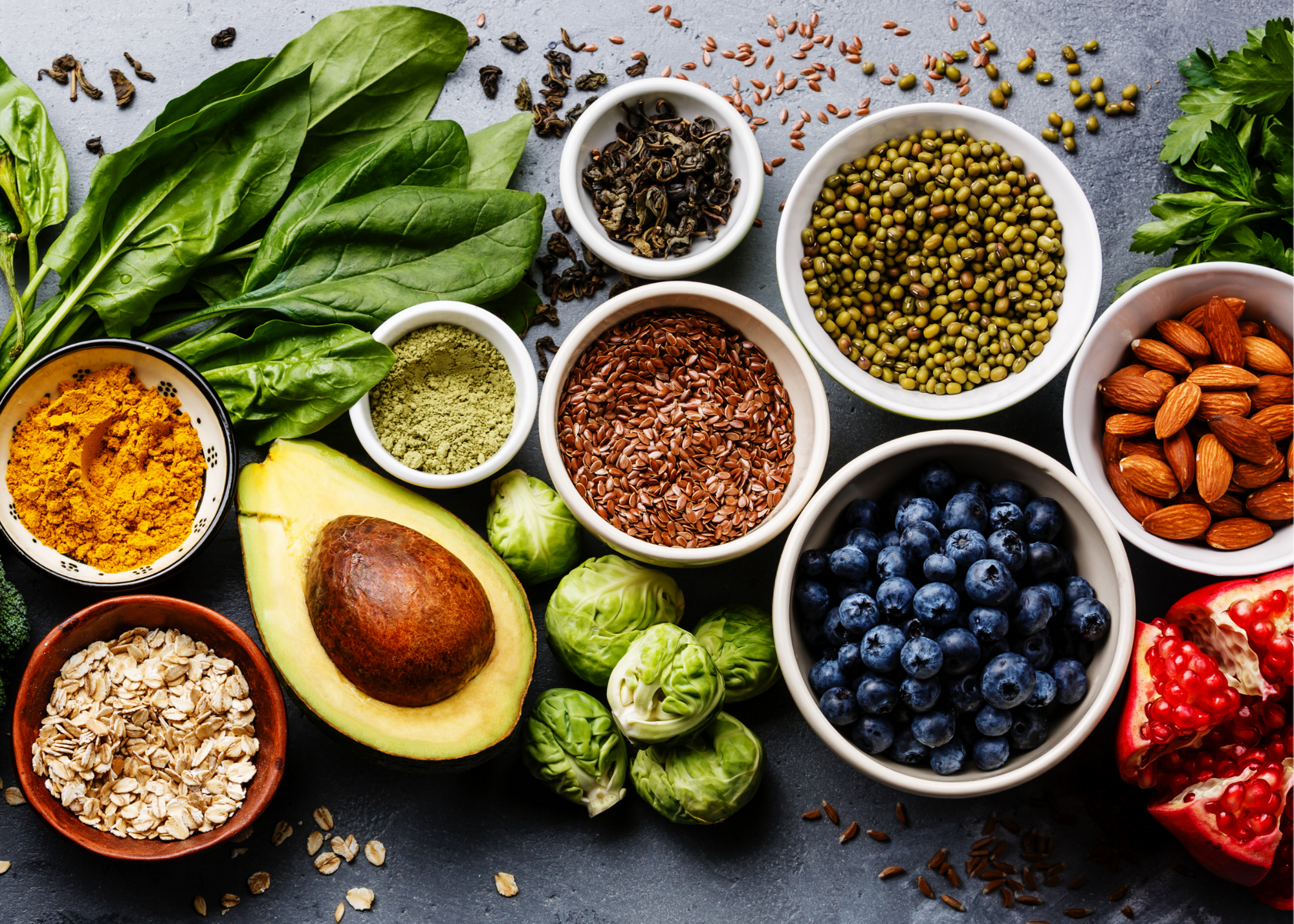Healthy weight loss & the low FODMAP diet: Is this the key to a healthy life?
Posted on January 06, 2021
We are at the time of year where new weight loss fads and diet trends cycle through our news feed. Given the low FODMAP diet involves dietary restriction; some of you might be wondering or have come across in social media, whether the low FODMAP diet can be used for weight loss.
Weight loss is not the point of the low FODMAP diet; it is to help those with IBS achieve symptom relief; and the end goal of living life with minimal dietary restrictions and symptom management.
So, while keeping this in mind, on today’s blog, we will be switching gears, focusing more on what a healthy lifestyle may look like and how you can apply this while following a low FODMAP diet.
Shifting the focus from weight loss while following a low FODMAP diet
The low FODMAP diet is not a weight loss diet; in fact, some dietary trends could potentially be doing harm when it comes to IBS symptoms. Check out our Fad or Foe blog post exploring the impacts of fad diets like juice fasts on IBS symptoms for more on this.
Here at FODMAP Friendly we believe in being healthy at every size, because healthy behaviours are more indicative of health than actual body size. Like the saying, don’t judge a book by its cover, you can’t judge someone’s health by just looking at them.
In saying this, if weight loss is your goal and you have IBS, seek out the help of an IBS & FODMAP trained Dietitian, who will be able help you do this safely, without implications to your IBS.

So, what are some changes I can make to work towards a healthful lifestyle?
There’s no special pill to guarantee longevity, in reality it involves making small changes and being able to turn those changes into habits. So here are some things you can do to work towards a more healthful life while following a low FODMAP diet.
Get those buns moving
Regular exercise does wonders for your overall physical and mental health; it can reduce chronic disease risk and help keep us strong and moving throughout our life.
Aiming for 30-40 minutes of movement 3-4 times a week, including resistance training ensures you’re on track to get all the benefits of exercise. Always remember that any exercise is better than no exercise, so if your goal is to join the 10,000 step club or run 10km you’re kicking goals.
Using exercise to our advantage
Whilst there are mixed feelings about exercise and IBS, you can use it to your advantage to manage symptoms. The key is low-to-moderate exercises such as: walking, yoga or leisurely swimming; even stretching works by massaging and relaxing your digestive organs. From there, if you feel comfortable, you can build up the intensity.
Regular exercise releases serotonin (our happy hormone) and overall, increases mood, decreases stress and evidently helps symptom management.
Hydrate, Hydrate, Hydrate!
Our body is about 70% water so it’s important to keep fluids up. Dehydration occurs when you lose or use more fluid than you take in. A general rule of thumb is to aim for at least 2L of water a day. If you regularly experience diarrhoea or constipation this is a bare minimum.
If you’re losing more fluid than a regular bowel movement (like with diarrhoea) you need to drink extra water to make up for it. On the other hand, constipation can be a sign of dehydration, where if you don’t have enough water in your body, it can result in hard and difficult to excrete stools.
When you’re undertaking the low FODMAP diet, there is a lot to think about. One easy tip is to get into the habit of taking a water bottle everywhere; it acts as a helpful reminder and has the ease of convenience.
Go for 7-a-day!
There’s an immense amount of research supporting the health benefits of a diet rich in fruit and vegetables, specifically aiming for 2 fruit and 5 vegetables.
Fruits and vegetables contain important vitamins, minerals, plant chemicals which are fundamental for our body to function. Aiming to eat a rainbow daily can help you achieve that 7-a-day.
Fruits and vegetables also provide dietary fibre and some prebiotics, which are important for digestive and gut health. Whether you have IBS-related diarrhoea or constipation, the right amount and type of fibre can help either soften stools or add bulk to ease bowel movements.
But wait, don’t fruits and vegetables have FODMAPs?
Some fruit and vegetables contain FODMAPs such as onions, cauliflower, mushrooms, apples and watermelon. But, there are so many yummy low FODMAP fruits and vegetables for you to enjoy.
Low-FODMAP fruits include:
Blueberries
Kiwi fruit
Strawberries
Unripe bananas
Low-FODMAP vegetables include:
Capsicum
Carrots (orange)
Tomato
Zucchini
Check out our Your Low FODMAP Shopping List blog post for some handy fruit and vegetable swaps to add to your shopping list.
You also don’t have to miss out on prebiotics on a low FODMAP diet, our website have listed FODMAP Friendly certified prebiotics AND probiotics available.
For a combination of Prebiotics and Probiotics:
The Gut Co FEED and REPAIR
Casa de Santé Advanced Probiotic & Prebiotics
Prebiotics:
happiGut™
Kfibre
inavea™ BAOBAB ACACIA
inavea™ PURE ACACIA
Nexira Fibregum
Can Prev Cyto Fibre
Can Prev Fibre Feel
Macro Mike – The Gut Doctor
Solnul™
MSPrebiotics
Probiotics:
Blackmores Probiotics + IBS Support
Casa de Santé Colon Cleanse & Probiotic
Stellar Labs Probiotic 40 Immune and Digestive Support Formula
Be a sleep advocate
During sleep, your body works to recover, repair and support brain development. When you don’t get enough sleep (that is 7-9 hours), it can impact your mood and ability to think, concentrate and perform everyday tasks.
Those with IBS can be more susceptible to having a poorer night’s sleep whether this is due to increased stress and anxiety around symptoms or gastrointestinal symptoms themselves. Getting enough sleep while undergoing the low FODMAP diet is a way you can look after your health and support your body.
Stress less
The brain has a direct link to the gut and vice versa, so if your brain is sending out stress signals, it’s likely that this is trickling down to the gut, potentially exacerbating IBS symptoms. By managing stress, especially when undergoing the low FODMAP diet, it can assist in the efficacy of the diet as well.

What’s the take home?
The low FODMAP diet is not intended as a weight loss diet. It is about empowering you to get in control of your IBS symptoms. What’s more important is living a healthful life full of regular exercise, staying hydrated, having your 7-a-day and managing sleep and stress while following a low FODMAP diet and beyond.
Having an IBS & FODMAP trained Dietitian in your corner while undergoing a low FODMAP diet can help answer questions and even tailor advice to help you to work towards adopting a healthier lifestyle.
Written by: Lauren Theodore (Accredited Practising Dietitian)
Reviewed by: Kiarra Martindale (Accredited Practising Dietitian)













